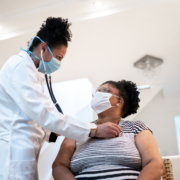New Information About COVID-19 for Expecting Moms
The COVID-19 pandemic has drastically changed how we as patients experience healthcare this year, and might arguably have affected expecting mothers more than most others. Presenting many new challenges such as adjusted prenatal visit scheduling, an increase in telehealth visits, and hospital policies limiting birthing partners and general visitors, expecting moms may also have felt added stress due to the lack of information available about COVID-19 in pregnant women.
Recently, a new study has been released by the CDC regarding the effects of SARS-CoV-2 (the virus causing COVID-19) on pregnant women, which highlights that pregnant women might be at increased risk for severe COVID-19 illness. This new evidence is suggestive of a different level of risk for pregnant patients. So what does this mean for you?
It is important to recognize there are limitations to the data in the existing study, and that research is ongoing. However, here are some key points you should be aware of:
- Data suggests that pregnant women might be at increased risk for severe COVID-19 illness.
- When compared to non-pregnant women of childbearing age who tested positive for COVID-19, pregnant women who were positive for COVID-19 were more likely to be hospitalized due to severe illness, and had a greater chance of receiving mechanical ventilation (the medical term for artificial ventilation where mechanical means are used to assist or replace spontaneous breathing). The likelihood of death in the pregnant women who tested positive for COVID-19 infection was not greater than COVID-19-positive non-pregnant women of childbearing age.
- Hispanic and non-Hispanic black pregnant women appear to be disproportionately affected by SARS-CoV-2 infection during pregnancy.
What are some of the new recommendations from CDC and other leading medical societies? What can you do to be safe?
- Awareness is important: healthcare providers are being encouraged by leading medical organizations including the CDC and American College of Obstetricians and Gynecologists (ACOG), to counsel patients about the potential increased risk of severe illness. Be proactive; ask your healthcare provider about your risk and how to stay safe.
- Do not skip prenatal care appointments! Your healthcare provider might be conducting some of your appointments virtually but it’s important that you are seen, even if via telehealth. CDC also recommends that you have at least a 30-day supply of medicines on hand, which can help limit errands to the pharmacy.
- CDC emphasizes how important it is for pregnant women and their families to take precautions that help prevent infection, like limiting interaction with other people as much as possible, and talking to a healthcare provider about how to stay healthy during the pandemic.
- Use the same precautions the CDC has advised everyone of to prevent the spread: wash your hands often with soap, avoid close contact with others, stay at least 6 feet (about 2 arms’ length) from people outside your home, cover your mouth and nose with a cloth face cover in public settings, clean and disinfect surfaces around you daily, and monitor your health. If you start feeling sick and think you may have COVID-19, call your healthcare provider within 24 hours.
- ACOG is encouraging pregnant patients who test positive for COVID-19 to consider enrolling in an appropriate COVID-19 registry, such as the COVID-19 PRIORITY Registry, to help the medical community better understand the impact of COVID-19 on pregnancy outcomes.
While this information may at first feel daunting, take comfort in the fact that many of the recommendations around how you can prevent yourself from being infected haven’t changed. It’s likely that you’ve already been doing everything you can to keep you and your baby safe.
As always, the best resource for information- especially how it pertains to your health, is your own healthcare provider. However the CDC and ACOG are great resources for supplementing information, and you can find their websites here:





